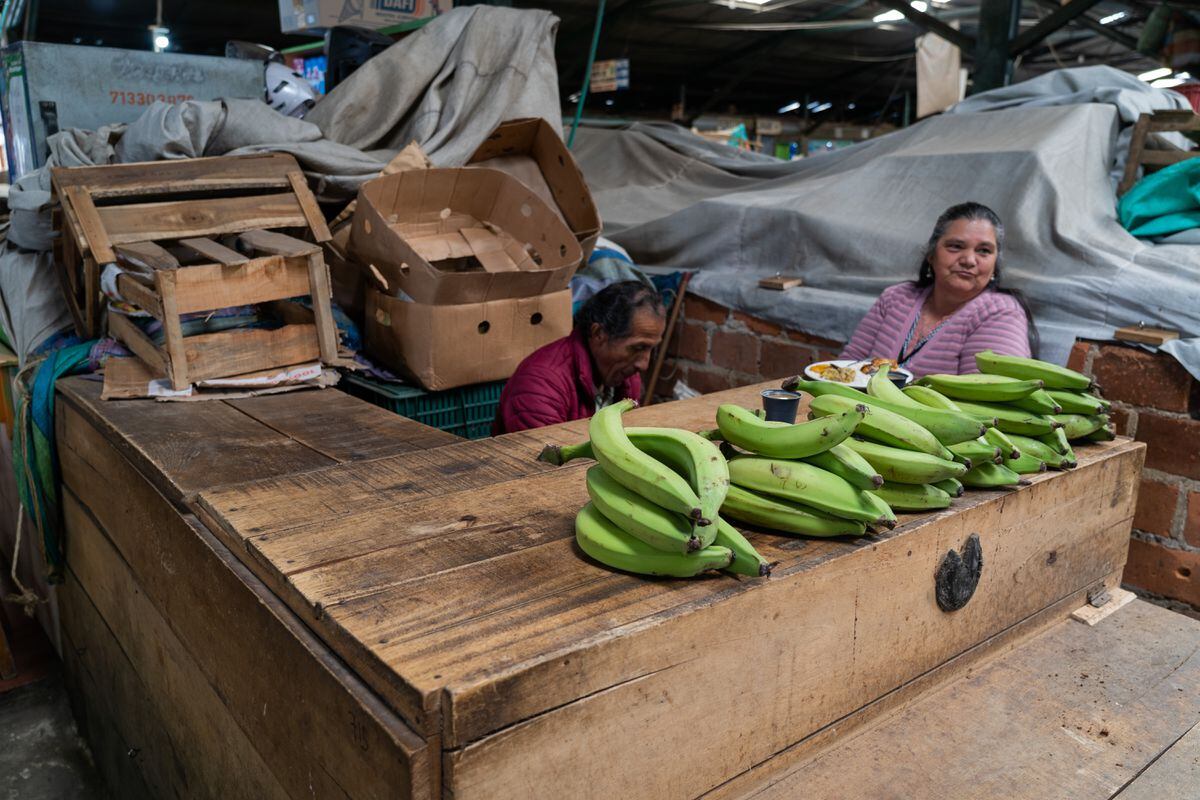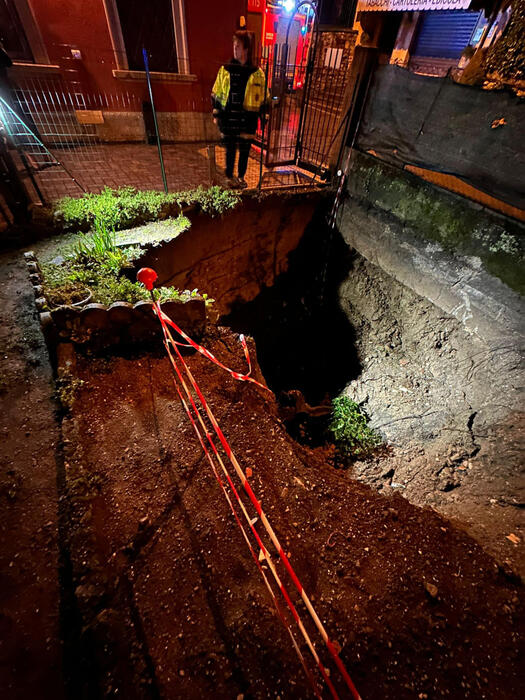Sometimes in the midst of chaos there is a strange feeling of tranquility.
That is felt on the morning of this Monday in Pasto, the capital of Nariño.
Endless lines of vehicles surround the city's gas stations to fill up their tanks.
No one knows how many hours he will spend there this time.
Neither is the price per gallon.
But no one honks a horn or shouts.
They advance and stop, like this for hours.
The custom of those who feel "Colombia's tail" has provided them with nerves of steel.
Even now, a landslide two weeks ago keeps them cut off from the rest of the country.
The images of the endless lines of vehicles, mopeds and taxis are more reminiscent of neighboring Venezuela than Colombia.
President Gustavo Petro was in Europe last week and due to the shortage of fuel in the department of Nariño he decided to return to Colombia "immediately".
From Ipiales, on the border with Ecuador, he announced on Sunday a maximum price per gallon of gasoline of 8,916 pesos.
A day later it is difficult to find that price.
When Daniel arrives to load his tank from the truck after three hours of waiting, he looks like a runner who has just crossed the finish line.
Happy and tired, although he has not risen from the seat.
The price of gasoline is not published anywhere, so you have to divide the final amount between the gallons supplied.
“It has come out to 10,200.
Not bad, it was at 12,000″, he says.
Spending three hours in line for the Pasto is a blessing.
A week ago the queues arrived at 4:00 p.m.
Row of cars to enter a gas station, in Pasto, on January 23, 2023.Juan Carlos Zapata
In Nariño, being isolated is not a novelty, although a case as serious as this has never been seen, in which the dates for a solution are diffuse.
When there is a strike or a protest, the demonstrators block the Pan-American Highway.
Doing so is like unplugging Nariño from the country.
Nothing can go in or out.
The collapse of 15 days ago did not take anyone by surprise either.
For about 70 years the department has been asking the central governments for a solution for the artery that connects them with the rest of the country and that between Cauca and Nariño was built on a geological fault.
The torrential rains of the past months led to the disaster.
A huge dirt plug cut off the highway on January 9.
That is the path that Julio Gómez, 50, used to do until now with his tractor-trailer to load gasoline in Yumbo, in Valle del Cauca, 340 kilometers away.
He took two days.
A week ago, when fuel was already running low, he left along with 39 other vehicles like his, through Ecuador, the only way to get there.
The 800 kilometer journey on roads and trails took them eight days.
"The expenses of the truck tripled," he complains.
Those 400,000 gallons that the trucks brought this past Sunday are what have given air to the situation, but it is not enough.
The Pasto mayor's office has placed officials at all stations to write down the plates of those who refuel, because no individual can do it again before 72 hours.
The taxi drivers, each 48. They want to avoid the black market that spread through the city and has not disappeared.
It's not like people hide either.
There are motorcyclists who recharge their tanks and at the exit they pass it to bottles with a plastic tube to get back in line.
Six women from the same family, between the ages of 12 and 45, spend the morning sitting on a street corner around two fruit boxes that function as an altar for several bottles that used to be liquor and now have gasoline. .
If they know what they're doing is illegal, they don't care.
“We always have and people always come who need it, who can't stand in line,” says one of the minors.
They sell it for 30,000 a gallon, triple that at a service station.
“We have all resorted to shopping like this at some point,” admits one man.
Illegal gasoline sales can be found in some sectors of the city.
The gallon costs 30,000 pesos, triple that in a service station.Juan Carlos Zapata
Gasoline is not the only thing that has risen in price.
In the Potrerillo market, the most popular in the capital, José Felix Mora attends to his butcher shop, where he begins to run out of pork because "they bring it from Cali" on the other side of the Pan-American Highway.
The beef comes from the south of the department, but it is more expensive due to the rise in fuel.
"They raise the price for me and I have to raise it to the people, what a pity, but what can I do with it," he laments.
A few stalls further in, under a huge sign saying “hair is bought”, Aura Rivera watches a series on her phone at her vegetable stall.
There is no customer.
“If the road is not fixed, we are going to lose.
We are throwing away product.
We used to sell 100,000 pesos a day and now half that.
We're screwed here."
Her three children, who are studying, depend on what she sells.
But if nothing goes in, neither does it come out.
Nariño is an area that mainly produces potatoes and milk.
The surplus has thrown prices.
The potato sack that a few weeks ago cost 130,000 pesos now sells for 75,000.
And dairy farmers have already had to dispose of part of the product.
The Government has promised to buy the crops that could be lost to distribute them within the department and the poorest areas.
Nariño represents less than 2% of the national GDP and a little more than 1,800,000 people live there, some 400,000 in the capital.
Here while the works in progress have also begun to stop.
As the materials did not arrive, or at such a high price, the projects have ceased to be profitable.
Unemployment will be the one to rise in the coming months.
The Government plans to build an alternative, but provisional, road in 30 days.
The final solution, a new route for the Panamericana, could take years to build.
Luis Eladio Pérez, a former senator from Pasto and the next candidate for governor of Nariño, believes that what needs to be done is a polyduct to fix the eternal problem of shortages.
This 70-year-old liberal politician cannot take a step through his city without meeting someone he knows.
His name became famous, in addition to being governor of the department three decades ago, due to his kidnapping by the FARC, who held him for seven years.
A vendor in one of the most important markets in Pasto, waiting for the clientele to increase in the coming days.Juan Carlos Zapata
One of those who comes across Pérez this Monday morning is the businessman Luis Ernesto Chávez, who is full of energy.
In minutes he will drive to the port of Tumaco, three hours from the capital, to receive the first large ship loaded with fuel that arrives in the department.
A ship that had to be brought from Houston and that is now expected to make the route between Buenaventura and Tumaco every four days with 1,500,000 gallons of fuel.
Chávez will receive him with all the mayors of the region and with part of the national government.
Petro celebrated it on Twitter: “The first ship arrived at the port of Tumaco (...) We will not let the southwest of the country run out of fuel or food.
In 10 days the Government will review whether the measures take effect or a national economic emergency will be declared to expand the aid.
The airport has become these days the only escape route for those who can afford it.
The frequency has multiplied and planes are constantly landing and taking off on this small runway that runs along a cliff.
The future is never easy in Nariño.
Nestled between mountains, in the Andean region, there is hardly any industry and the majority of the population is rural.
Leaving here is not easy even when the Panamericana is open.
Now, closed, it is like a pressure cooker that only the steely nerves of the pastuso prevent it from exploding.
At least for now.
Subscribe here
to the EL PAÍS newsletter on Colombia and receive all the latest information on the country.





/cloudfront-eu-central-1.images.arcpublishing.com/prisa/TQZBOKCBUZFHZPEX2X4N7IR6GI.JPG)
/cloudfront-eu-central-1.images.arcpublishing.com/prisa/GQYVWOXKKFC7XPP7HCG4EUZJ5M.png)


